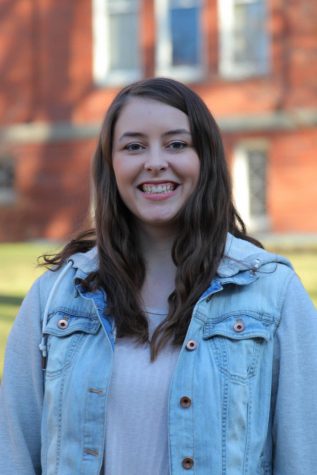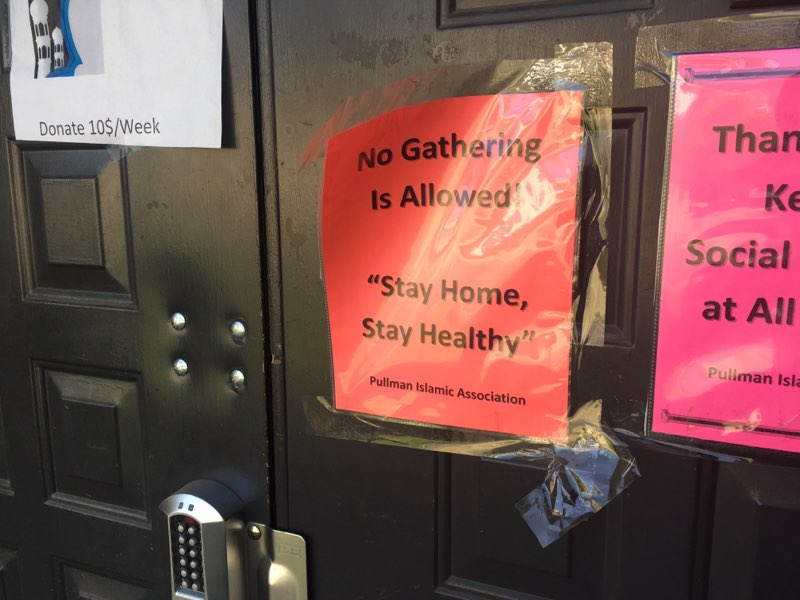
Madysen is a Senior journalism and media production major from Rosalia, Washington. She also is involved with Residence Life, the Association for Women...


Many churches held online services, look forward to reconnecting in person
April 22, 2020
When Gov. Jay Inslee issued the executive order to stay home, it left religious leaders questioning how they would conduct their day-to-day services.
“I think all of the churches feel the ache of not being together physically,” said Ern Menocal, lead pastor for the Hills Church in Pullman.
The Hills Church has made the switch to being completely online.
Menocal said although the Hills Church does not offer live streaming, they are continuing to record their Sunday services for their members. The recordings can be accessed on its Facebook page and website.
The church also is meeting for small group sessions once a week. These small groups meet Monday through Thursday.
He said the church faced challenges with technology because before COVID-19 they used very little, but now they are using recorded sermons and video call applications, like Zoom.
“There have been churches that do a lot more video production on online platforms,” he said. “We’re kind of low tech in our nature and have had to adapt rather quickly.”
Menocal said church members throw a fun “Zoom party” on the weekends, where people can talk and play online games together.
Another Pullman-based church, the Living Faith Fellowship, is live streaming all its Sunday services via Facebook, YouTube and sometimes Instagram TV.
Joe Fitzgerald, Living Faith Fellowship college campus pastor, said the main challenges with online services include not having interaction with the congregation besides through chat.
“I think Jimmy Fallon and a bunch of the live evening shows have struggled with something like this,” he said.
Church members can chat with each other 30 minutes before the service starts, Fitzgerald said.
The congregation members seem to enjoy the live streaming because it feels like the service is happening right then and there, he said. People can worship in their homes while staying in their pajamas.
“People are very excited to get back together again,” he said. “It’s going to be a really happy reunion.”
Weekly gatherings are not the only events being canceled for churches. Easter services had to take a different spin this year.
Menocal said the typical Easter service brings in hundreds of regular members and guests into the building. The service also usually includes a free meal.
Instead, the church provided a recorded online service and the chance for church members to leave thoughts in the Facebook comments, he said.
“It’s in our DNA just to be relational people,” Menocal said. “I think that the single most difficult part of self-isolating and social distancing is not being able to gather together regularly in church.”
Despite the challenges, he said the community has expressed they are doing well in balancing their time and making sure to connect with people.
In addition, the First Presidency for the Church of Jesus Christ of Latter-Day Saints announced temporary closures for all temples. The announcement went into effect on March 25.
The Pullman Islamic Center, operated by the Pullman Islamic Association, gradually transitioned to online services as the COVID-19 situation further developed.
Raed Alsawaier, Imam for the Pullman Islamic Center, said when the virus was first spreading the mosque began sanitizing surfaces frequently, as well as limiting the number of people in the center to 50.
“There was an exhausting effort in the beginning,” Alsawaier said.
Once the stay-at-home order went into effect, the Islamic Center switched to completely online, which included led prayers, sermons recorded on Panopto and Board of Trustee meetings via Zoom.
Language and religious teachings are now over Zoom as well.
Alsawaier said the center is run on donations from the congregation without any federal support. To keep the mosque financially supported, congregation members can donate to the mosque online through PayPal.
“Whether they’re Muslim or not, people can maintain an obligation to support people,” he said. “I’ve heard beautiful stories about people going into Moscow to help an older lady who needed groceries.”
With Ramadan, a month of fasting, prayer and community, beginning April 23 and lasting until May 23, this year’s observance will be out of the ordinary.
Congregation members of the mosque suggested ideas on how to celebrate together, Alsawaier said. One member suggested they host Zoom prayer sessions.
Normally, the mosque would come together and host potlucks, he said.
Alsawaier said the center had faced some accessibility issues before transitioning to online.
Some members from Lewiston could not physically attend, but now they can with classes and services being online, he said.
“We are willing to do anything in our capacity as community members to support the community,” Alsawaier said.

Madysen is a Senior journalism and media production major from Rosalia, Washington. She also is involved with Residence Life, the Association for Women...